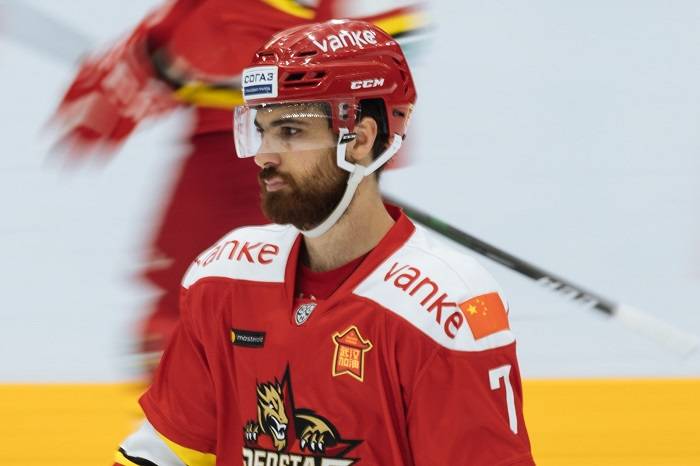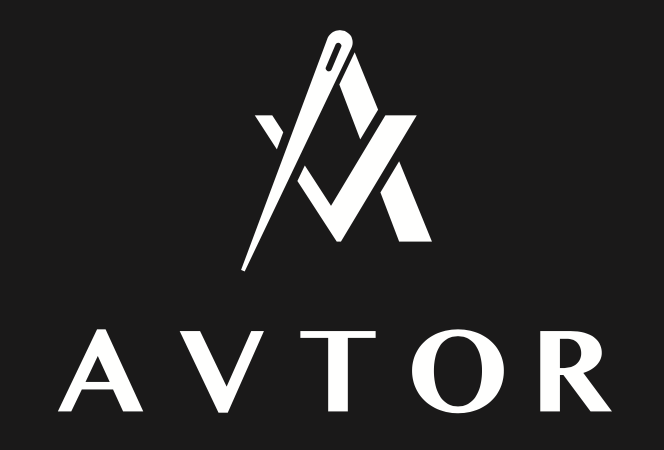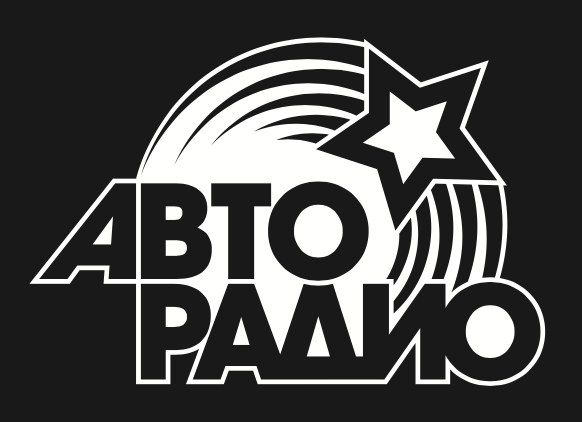The Faceoff: Jake Chelios
20 May 2020
Jake Chelios did not intend to wear the #7 in his debut KHL season, nor did he begin his hockey career as a defenseman. The twenty-nine-year-old Kunlun Red Star newcomer acknowledges that the hockey gods may have been at play in forcing him to pay homage to his father, three-time Stanley Cup Champion Chris Chelios. “It was never up to me, I guess,” the Beijing blue-liner joked, but embracing a hockey adventure in China was wholly his own doing—a transatlantic trip that he will repeat next season.
Despite a difficult January that forced Kunlun into exile as the COVID-19 situation escalated, Chelios took the road bumps in stride, attributing his positive outlook to the personalities on the team and the leadership of NHL alum Brandon Yip. The Chicago native logged an average of twenty minutes per game alongside Kunlun veteran Victor Bartley, and later in the season, high-producing newcomer Trevor Murphy.
Chelios has spent quarantine surfing and mountain biking in California, where he is currently spending time with family. We caught up on his adjustment to the K, Kunlun’s rocky season and his new-found interest in real estate.

There was a point in time when Kunlun was storming the Eastern Conference, and it seemed like a playoff spot was all but guaranteed. What contributed to the unraveling in the last leg of the season?
It’s just one of those things. Honestly, since I’ve turned pro, I’ve had a lot of similar seasons where it comes down to one or two points at the end of the year. Each time it has been like that, they were very streaky teams. When I played in Charlotte, we went on an eighteen-game winning streak and we barely made the playoffs because we were in last place at one point. Kunlun kindof was the same. I guess you could say our reputation was that we would win eight games in a row and then we would lose eight in a row. Obviously, you don’t want to use the excuse that we were on the road at the end, because I think we could have easily put together a few wins during that final road trip. But maybe some games got away from us. That’s how it is in hockey. I think if another 10-15 games had gone on, we’d go hot again, and we’d have been right back to where we started. We got cold at the wrong time, and it cost us a playoff spot.
Do you feel that Kunlun’s struggle to score put extra pressure on the blue line to produce offensively?
You know what, it did. At a certain point this season, we knew we weren’t scoring many goals. You can’t put that on the forwards solely because I think some of the best offensive teams have the best defensemen at moving the puck out and making that first pass, letting the forwards do their thing. Obviously, we lost Brandon Yip at a crucial time for a few games there in January. Andrew Miller was struggling with an illness for a while, and those are the two guys you can’t really afford to lose.
That’s the biggest difference between being a forward—they can make a lot more mistakes, and it’s not going to hurt you. As a D, if you make the one mistake that costs a goal, that could be the game right there. It does put added pressure.
You mentioned the loss of Brandon Yip. How would you characterize his leadership within the organization?
It’s crazy to have somebody like that who was able to go to China and has had NHL experience. He’s all-in on Kunlun. The way he is off the ice, he’s an ambassador of the sport to China. The second everybody signs, the first message you get is a Facebook message from Yip welcoming you to the team and if you need anything, to let him know. When you get there, he treats everybody the same. He’s a great guy whether you’re a call-up or you’ve been there for three years. Between the coaching staff being North American and him, it made things so much easier. The experience he brings in the league and the fact that he produces that well offensively every year, it just makes for a great leader.
Kunlun was unexpectedly forced to remain on the road for the rest of the regular season when the coronavirus situation escalated. How did you handle the news?
I think it was early or mid-January. There were a couple of girlfriends on the plane because they were warned that maybe they did not want to stay [in China]. We still packed for a two or three-week road trip and thought we’d come back. All of our bags were left in our apartments. When we found out a couple of days later, we realized we would be in a hotel for the next month and a half! Honestly it was such a fun group of guys, and a lot of us were living in hotels in China anyway. I don’t know if it changed that much for us. I think the biggest thing was that guys were trying to do laundry and we only had these little suitcases! Our bags from China did not get back until probably a month and a half after we got home. You definitely learned how to live out of a suitcase, but it wasn’t the worst thing in the world. We stayed in Moscow a lot, so it wasn’t too much of a grind.
The team did a really good job throwing my stuff into boxes and getting it home. A couple of things couldn’t get through customs—some of the name-brand stuff—but for the most part, I got everything back. I don’t have too many name-brand things, but one was my suitcase! [Laughs] So they cut the suitcase and put all of my clothes into a big DHL box.
How would you contrast Curt Fraser’s approach to that of the Russian teams you played this season? Can you win this league playing North American-style hockey?
The [Russian teams] definitely have their league down to a science at this point because they’ve been doing it for so long. At the beginning of the year, we were trying to use the North American style of play to our advantage. It’s only Curt Fraser’s second year in the league too, so I think as the year went on, both the players and coaches adjusted. We still try to stick to our North American style because it seemed effective against most teams, but when you play the higher-end teams, I think we are still learning how to adjust to their speed and the way they pass.
I definitely understand why a lot of these teams play so defensively, because when you play against the better teams, they are so good at moving the puck and you are not going to be able to out-offense them. I think when it comes down to those games, we are going to have to rely on one or two goals to win the games, and obviously a lot of the pressure will go on the goalies.
I would say that the only disadvantage was, being mostly North Americans, we play a smaller, grittier game. In this league, it’s a little more flow and almost momentum-driven like soccer. You’ll be in possession of the puck for five minutes, and then they’ll be in possession of the puck for five minutes. I’ve never seen any lead changes like there were this year. We’d be up three goals, and then ten minutes later, we were down two. That was a common theme throughout the league, which you just don’t see in North America. I think it’s about more experience and learning how the game is played [in Russia], because it is different.
You are a strong skater to begin with, but Kunlun plays on the Olympic ice sheet at home. How did you adjust?
Luckily training camp was long, and we were practicing on the biggest ice in the world! [Laughs] So that actually ended up helping a lot, because it was so exaggerated. Honestly I think it’s more for forwards, they have to adjust more. In North America, you beat a guy and you’re gone. As a defenseman on the big ice, you keep them to the outside and it’s almost harder for them to beat you. You definitely can’t get caught looking at the puck when they are far to the outside. You learn quickly, and our defensive coach Steve Kasper was good at telling us to stay inside the dots. It didn’t take too long, especially as some of the ice surfaces were NHL-sized. Because we were able to practice on that insane ice, we got thrown into the fire and learned pretty quick.
That ice sheet was basically the size of the Pacific Ocean.
[Laughs] Some practices I didn’t even make it to the other side of the ice, it was so big!
Kunlun switched up its defensive pairings a bit. You started with Victor Bartley and ended with Trevor Murphy. What was your experience working with two very different defensemen?
We were lucky. We had six, seven solid D back there. Whoever you played with, you were never in a bad situation. Obviously playing with Bartley is extremely easy because of all of the experience he has and the way he can play. We played together for so long that toward the end, we could read off of each other. He is so good at hitting that I was able to filter guys to his side, and all of a sudden, those guys were almost dead. That made things a lot of fun to play with him.
When we were struggling for goals, Kasper had Murphy and Sproul together, and they were the offensive pairing. I think he wanted to split it up and get two pairs that could contribute. Murphy was just as good to play with, just a lot different. With us, I gave him the puck because he is so good at making plays and I would back him up. I thought we worked well together too.
Moving a hockey career to Europe is a big jump. China is another level. What brought you to Beijing in the first place?
I had never really explored overseas, even toward the end of the season when I was in Grand Rapids. I wasn’t really thinking about it. I asked Andrew Miller for his agent’s number, and I said, “I don’t know how serious I am, but can you see what kinds of teams would be interested over there?” A few days later, he called me and said that China and the KHL were interested. I had a relationship with Curt Fraser beforehand and I played with a few guys like Andrew Miller who were already signed for them. So although it was in China, it was the most comfortable situation because I knew the coach. Most of the players were going to be North American, so there was no language barrier. I don’t know if I would have been ready to make the jump to a Russian team just because it is such different training camps and style of play, so this was a perfect situation in terms of making a transition overseas.
I noticed you wore the #7 this season, which is the number your dad changed to when he joined the Chicago Blackhawks. Did you set out to honor him this season?
Not exactly—he was very excited when I told him though, because he had been trying to get me to wear that number for years! I did wear it growing up. How it happened was pretty funny. They texted our group chat asking what number everybody wanted to wear. As they texted, I was about to answer “27” because I had always worn it. Adam Cracknell called me right before I texted back and we talked for ten to fifteen minutes. I knew him from before, so we talked about our transition, when we were leaving, and how training was going. The second I hung up, Adam Cracknell—without even telling him the number I wanted—texted that he wanted number 27. So he stole it from me! After that I wanted 42, which I think Garet Hunt had taken. And then at that point, the equipment manager was like, “How does 7 work?” It probably would have been my next choice anyway…
So wait—have you told Dad yet that you took his number as literally the last resort?
[Laughs] I did not break that news, no!
Now what about your choice to become a defenseman?
At the end of the day, I made that decision on my own. For my career, you could say, he’s always left me to those big decisions. Obviously after games he would tell me little things, but those big decisions, I’ve always made on my own.
I switched after my first year of juniors. I wasn’t a great skater back then, and forwards were starting to become really good skaters and puck-handlers. I didn’t have that puck-handling and burst away speed to get away from defensemen, so every year I was more of a defensive forward anyway. After my first year in juniors, I was getting recruited for college and I just asked if I could try it. I was a healthy scratch the first game as a defenseman, and then I scored three goals in the first three games. It was insane because I wouldn’t have done that as a forward! So, they were like, you’re not going back to forward ever.
You can understand their reasoning.
They were terrible goals, too. I think it was just meant to be. But no, it did feel natural. I was always a defensive forward, and at the time, my team in college was looking for more defensemen. As a forward, you handle the puck a lot more so it was easy to transition back and make those first breakout passes. The first couple of years, obviously, it was hard learning your gap and all of the defensive things. I was lucky that I had four years in college to develop that, and it got me ready for pro.
It’s funny how you fell into defense and then the number seven. The hockey forces conspired to make you pay homage.
I know. It was never up to me, I guess!
Like most of America, I am totally absorbed in ESPN’s Michael Jordan feature “The Last Dance” right now. I was wondering how you were enjoying it given your family’s connection to MJ?
I’ve met him a couple of times in the last few years. Obviously growing up in Chicago, he and my Dad were both playing at the United Center so I saw them all of the time. There is a guy in the documentary, his name is George Koehler. He’s Michael’s best friend and they’ve been together forever. George owned Charlotte’s basketball team, and I played down there for three years. I’d hang out with [George] at the games a lot, and I’d get to see MJ and say hi in the locker room afterwards. It really is like seeing a god figure when you are up-close and personal. Obviously I wasn’t old enough to understand when I would watch him play, but now seeing his documentary, you realize how ridiculous it is. How competitive and how dominant he was. [My Dad] and Jordan still talk and it’s a cool relationship, for sure.
In light of quarantine, how have you been keeping fit?
Not much has changed for me. Growing up, even in college, I’ve never really skated in the summer. I’ve always let my body heal and have been big on that. I usually wouldn’t start skating until mid-June, so that part of it hasn’t changed. The gym I go to is closed, but I’ve been able to keep in contact with a trainer and do my own thing. In Chicago, it got hard when I was in my apartment and trying to make up workouts. I’m sure you’re the same way, you get sick of it after a while. I came out to California with family and it has been ten times easier because I go surfing everyday and mountain biking. When you’re on the beach, you stay active and the nice weather changes everything. It’s not exactly the same, but it hasn’t been too difficult to stay in shape.
Surfing and mountain biking in California. As far as quarantine situations go, I think you win. My last question for this series, as always: what were you reading, listening to and watching on the road this season?
This year, I did a pretty good job of reading real estate books…
Victor Bartley alert!
I was just going to say, I was fortunate enough to meet Victor Bartley in the beginning of the year! I was always interested, but never read any books or looked into it too much. With no internet on the plane, I figured this was the year to buckle down and learn something else besides hockey. Buy Bartley a bottle of white wine and he’ll talk your ear off about anything real estate. He was actually a big help recommending podcasts and books and that kept me occupied, which was awesome throughout the year.
I don’t think you even have to buy him a bottle of wine to get him going.
What’s crazy enough is that right when I got back, I bought a place. A few weeks later, he texted me saying that he bought a place about five minutes away and his family is moving there June 1st from Nashville. It will be nice to have him around. But yeah, he saved me this year—I wasn’t on the Netflix train as much, and obviously in China, it’s harder to do that with the VPNs. I came to a point where I was like screw it, I’m done trying to watch stuff. I got into the real estate podcasts and books for the first time in my life, and I am glad I did it.


















Leave a Reply